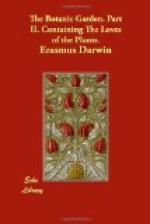the execution of it. In this treatise the Doctor
has demonstrated, that we see certain colours, not
only with greater ease and distinctness, but with
relief and pleasure, after having for some time contemplated
other certain colours; as green after red, or red
after green; orange after blue, or blue after orange;
yellow after violet, or violet after yellow.
This he shews arises from the
ocular spectrum
of the colour last viewed coinciding with the
irritation
of the colour now under contemplation. Now as
the pleasure we receive from the sensation of melodious
notes, independent of the previous associations of
agreeable ideas with them, must arise from our hearing
some proportions of sounds after others more easily,
distinctly, or agreeably; and as there is a coincidence
between the proportions of the primary colours, and
the primary sounds, if they may be so called; he argues,
that the same laws must govern the sensations of both.
In this circumstance, therefore, consists the sisterhood
of Music and Painting; and hence they claim a right
to borrow metaphors from each other; musicians to
speak of the brilliancy of sounds, and the light and
shade of a concerto; and painters of the harmony of
colours, and the tone of a picture. Thus it was
not quite so absurd, as was imagined, when the blind
man asked if the colour scarlet was like the sound
of a trumpet. As the coincidence or opposition
of these
ocular spectra, (or colours which
remain in the eye after having for some time contemplated
a luminous object) are more easily and more accurately
ascertained, now their laws have been investigated
by Dr. Darwin, than the
relicts of evanescent
sounds upon the ear; it is to be wished that some ingenious
musician would further cultivate this curious field
of science: for if visible music can be agreeably
produced, it would be more easy to add sentiment to
it by the representations of groves and Cupids, and
sleeping nymphs amid the changing colours, than is
commonly done by the words of audible music.
B. You mentioned the greater length of the
verses of Homer and Virgil. Had not these poets
great advantage in the superiority of their languages
compared to our own?
P. It is probable, that the introduction
of philosophy into a country must gradually affect
the language of it; as philosophy converses in more
appropriated and abstracted terms; and thus by degrees
eradicates the abundance of metaphor, which is used
in the more early ages of society. Otherwise,
though the Greek compound words have more vowels in
proportion to their consonants than the English ones,
yet the modes of compounding them are less general;
as may be seen by variety of instances given in the
preface of the Translators, prefixed to the SYSTEM
OF VEGETABLES by the Lichfield Society; which happy
property of our own language rendered that translation
of Linneus as expressive and as concise, perhaps more
so than the original.




